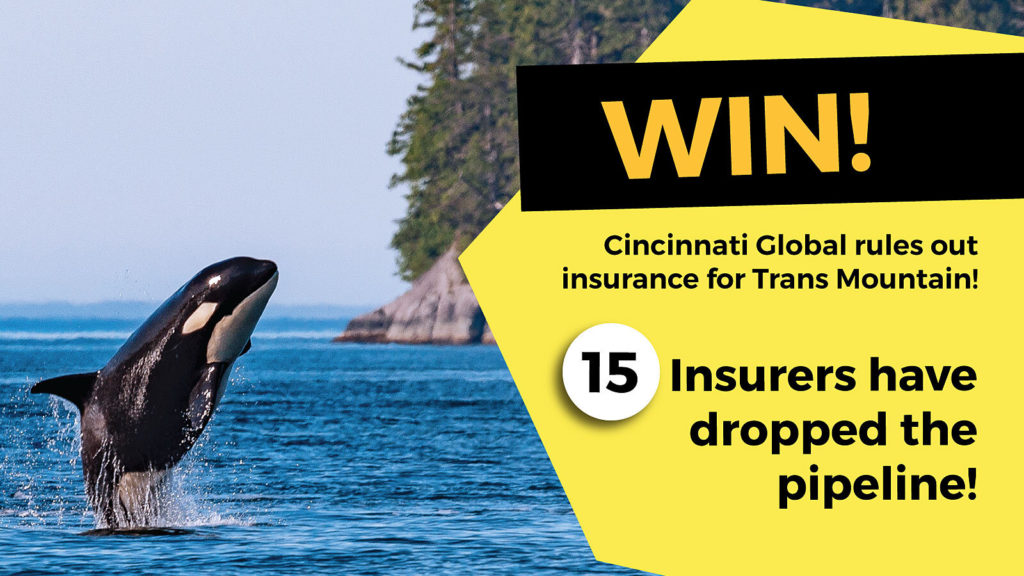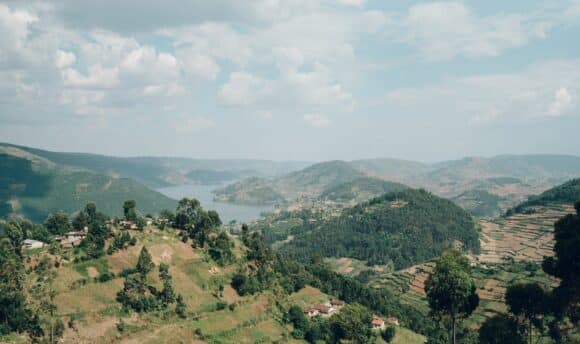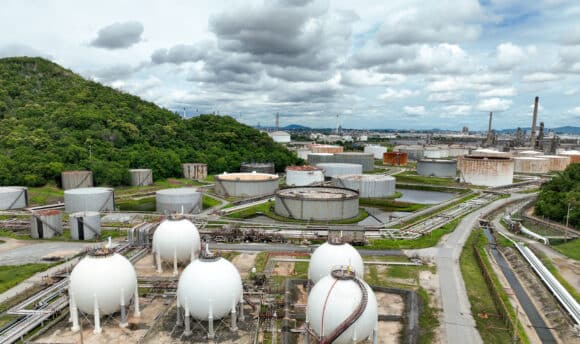
Lloyd’s syndicate member Cincinnati Global is now 15th insurer to commit to not insure or reinsure the existing Trans Mountain pipeline or expansion project
August 3, 2021 – Lloyd’s of London syndicate Cincinnati Global Underwriting has ruled out insuring the existing Trans Mountain tar sands pipeline and the Trans Mountain Expansion Project. Cincinnati Global, a subsidiary of Cincinnati Financial, joins fourteen other insurance companies that have vowed not to touch Trans Mountain.
In an email to Greenpeace Toronto, Cincinnati Global Underwriting’s CEO Derek Eales stated: “I can confirm that Cincinnati Global has no current involvement in the Trans Mountain Pipeline / Expansion project and will not offer any participation on an insurance or reinsurance basis in the future.”
Grand Chief Stewart Phillip, President of the Union of British Columbia Indian Chiefs, said: “This is the 15th insurance company to refuse to provide the millions of dollars in coverage the pipeline needs to become operational. Not only must Liberty Mutual, Chubb and AIG follow suit and refuse to provide insurance to the Trans Mountain pipeline, but the entire oil and gas industry needs to commit to commit to rigorous environmental protection policies and standards that explicitly accept and align with the UN Declaration and Indigenous People’s right to Free, Prior and Informed Consent.”
Trans Mountain is currently on the market to secure coverage by August 31, 2021, when its policy for the existing pipeline expires. In advance of that deadline, a global campaign is calling on insurers to rule out providing coverage. At the end of June, there were actions in more than 25 cities and towns across four continents calling on insurers to take action to stop insuring tar sands pipelines like Trans Mountain and respect Indigenous rights.
Lindsay Keenan, European Coordinator for Insure Our Future, said “Cincinnati Global’s commitment to not insure Trans Mountain should be a signal to the rest of the Lloyd’s market to follow suit. Lloyd’s Chair Bruce Carnegie-Brown needs to make a clear statement on behalf of all of Lloyd’s members that no Lloyd’s syndicate shall renew insurance for any aspect of the Trans Mountain tar sands pipeline.”
In February 2021, the Canadian-owned Trans Mountain corporation petitioned the Canada Energy Regulator to keep the names of its insurance backers secret, stating that it had “observed increasing reluctance from insurance companies to offer insurance coverage for the Pipeline and to do so at a reasonable price.” The Canada Energy Regulator approved the request on April 29, 2021, and Trans Mountain’s most recent insurance certificate was publicly filed with the insurance company names redacted. Insurers listed on the most recent public certificate who are still believed to be insuring the pipeline include Lloyd’s of London, Chubb, Liberty Mutual, and AIG.
Sven Biggs, Canadian Oil and Gas Program Director for Stand.earth said “Right now the impacts of climate change, wildfires, floods and heat waves, can be seen all around us. Insurance companies, like Cincinnati Global, know that climate change is bad for their bottom lines, as claims from extreme weather events continue to mount. The Trans Mountain pipeline would lead to the same amount of climate pollution as 21 new coal fired power plants, and would be like adding more fuel to those fires. This pipeline is bad for the climate and it is bad for business.”
Construction of the massive tar sands pipeline is plowing ahead up north in the face of sustained, Indigenous-led resistance, and surveillance of land defenders is increasing. Last month, Trans Mountain’s security team invaded the Secwépemc territory of the Tiny House Warriors and installed massive surveillance towers with robotic cameras, floodlights, and fencing, after taking down the security barriers set up by Tiny House Warriors. Trans Mountain has not obtained the Free, Prior, and Informed Consent of the Secwépemc people to build this pipeline on their land, and the project is also being challenged by First Nations and Indigenous communities at other points along the route.
Charlene Aleck, elected councillor and spokesperson for Tsleil-Waututh Nation’s Sacred Trust Initiative, said: “After a thorough review of the Trans Mountain Pipeline and Tanker project under our own unextinguished laws, Tsleil-Waututh Nation withheld our Free, Prior and Informed Consent. We commend Cincinnati Global for their prudent decision and urge other insurers to understand that the violation of Indigenous rights is a material risk, just like climate change.”
ADDITIONAL QUOTES
- Kukpi7 Judy Wilson, Secretary-Treasurer, Union of British Columbia Indian Chiefs: “Insurance companies are waking up to the reality that the breakdown of the climate means not only the destruction of their business models, but the beginning of a global humanitarian and environmental crisis in which devastating fires, floods, and crop failures will lead to catastrophic loss of life and damage to our planet. By insuring Trans Mountain, the insurers providing coverage are directly responsible for accelerating climate chaos and grievously harming and undermining Indigenous Title and Rights. Insurance companies need to realize it is unacceptable and in contravention of the UN Declaration to continue with a fossil fuel project that infringes upon the rights and jurisdiction of Indigenous Peoples. They must realize and respect First Nations’ rights to conserve and manage the lands, territories, and resources they have stewarded over since time immemorial.”
- Jackie Fielder, Stop the Money Pipeline Communications Director, “This project has visited enough harm on First Nations and their rights to Free, Prior, and Informed Consent and does not align with the IEA’s recent finding that new oil and gas development is incompatible with a net zero 2050 timeline. More insurance companies need to align their portfolios with the coming risks and cease coverage of new fossil fuel infrastructure.”
- Mary Lovell, Insurance Campaign Coordinator at Rainforest Action Network said: “Fifteen insurers ruling out insurance for Trans Mountain pipeline is a major industry indicator. Insurers are experts in calculating the risk associated with climate change. With Trans Mountain’s cost overruns and years of delays, the company’s terrible record on Indigenous rights, and the rash of heatwaves and wildfires across the continent, this most recent wave of exits underscores that any tar sands expansion is uninsurable for any forward-looking business.”
ADDITIONAL BACKGROUND
- Lloyd’s of London is an insurance marketplace made up of around 80 insurance companies who together insure some of the riskiest and most controversial projects in the world. Lloyd’s syndicates are likely the lead insurers for the existing Trans Mountain pipeline for 2020-21. In December 2020, the Lloyd’s marketplace adopted a weak policy restricting involvement with tar sands projects like Trans Mountain’s pipelines, asking insurance companies that operate within Lloyd’s to not provide new insurance cover for tar sands projects by 2022, but the policy allows for continued coverage for the tar sands sector until 2030.
- If built, the Trans Mountain Expansion Project would transport an additional 590,000 barrels of tar sands oil per day from Alberta to British Columbia, and lead to a 700% increase in oil tankers in the Salish Sea. Many Indigenous communities have consistently and repeatedly rejected the Trans Mountain pipeline and tanker project – but the Canadian government continues to plough ahead with construction.
- The construction costs of the Trans Mountain expansion are ballooning. When former owner Kinder Morgan first unveiled the project in 2014, the construction cost was then estimated at $5.4 billion. Since then, the price tag has steadily increased, first to $7.4 billion in 2017, and then to $9.6 billion in 2018. The costs of the Trans Mountain Expansion are currently estimated to be $12.6 billion CAD, an increase of 133 percent from 2014.



